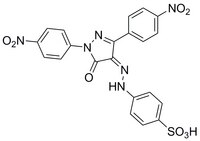538099 Sigma-AldrichGS-493 - Calbiochem
A cell-active, bioavailable, efficacious SHP2 inhibitor. Retards cancer cell mobility & invasiveness, and prevents tumor growth in a xenograft mouse model.
More>> A cell-active, bioavailable, efficacious SHP2 inhibitor. Retards cancer cell mobility & invasiveness, and prevents tumor growth in a xenograft mouse model. Less<<Synonyms: 4-((2Z)-2-(1,3-bis(4-Nitrophenyl)-5-oxo-1,5-dihydro-4H-pyrazol-4-yliden)hydrazino)benzenesulfonic acid, (Z)-4-(2-(1,3-bis(4-Nitrophenyl)-5-oxo-1H-pyrazol-4(5H)-ylidene)hydrazinyl)benzenesulfonic acid, SHP2 Inhibitor VII
Recommended Products
Overview
| Replacement Information |
|---|
Key Specifications Table
| Empirical Formula |
|---|
| C₂₁H₁₄N₆O₈S |
Products
| Catalog Number | Packaging | Qty/Pack | |
|---|---|---|---|
| 5.38099.0001 | Glass bottle | 10 mg |
| Description | |
|---|---|
| Overview | A cell-permeable, bioavailable, non-toxic p-nitro analog of PHPS1 (Cat. No. 540213) that exhibits enhanced potency and selectivity. Acts as a phosphotyrosine mimetic, substrate-competitive and reversible catalytic domain inhibitor of SHP2 (IC50 = 0.071, 2.08 & 3.17 µM for SHP2, SHP1 & PTP1B, respectively). Dose-dependently reverts HGF-stimulatd epithelial-mesenchymal transition of HPAF II cells and blocks human lung adenocarcinoma LXFA 526L anchorage-independent growth. Shown to significantly retard LXFA 526L xenografted tumor growth in mice (46 mg/kg/day, i.p., q.d.). Please note that the molecular weight for this compound is batch-specific due to variable water content. Please refer to the vial label or the certificate of analysis for the batch-specific molecular weight. The molecular weight provided represents the baseline molecular weight without water. |
| Catalogue Number | 538099 |
| Brand Family | Calbiochem® |
| Synonyms | 4-((2Z)-2-(1,3-bis(4-Nitrophenyl)-5-oxo-1,5-dihydro-4H-pyrazol-4-yliden)hydrazino)benzenesulfonic acid, (Z)-4-(2-(1,3-bis(4-Nitrophenyl)-5-oxo-1H-pyrazol-4(5H)-ylidene)hydrazinyl)benzenesulfonic acid, SHP2 Inhibitor VII |
| Description | GS-493 |
| References | |
|---|---|
| References | Grosskopf, S., et al. 2015. ChemMedChem. 10, 815. |
| Product Information | |
|---|---|
| Form | Orange solid |
| Hill Formula | C₂₁H₁₄N₆O₈S |
| Reversible | Y |
| Quality Level | MQ100 |
| Applications |
|---|
| Biological Information | |
|---|---|
| Primary Target | SHP2 |
| Primary Target IC<sub>50</sub> | 0.071, 2.08 & 3.17 µ |
| Purity | ≥98% by HPLC |
| Physicochemical Information | |
|---|---|
| Cell permeable | Y |
| Dimensions |
|---|
| Materials Information |
|---|
| Toxicological Information |
|---|
| Safety Information according to GHS |
|---|
| Safety Information |
|---|
| Product Usage Statements |
|---|
| Packaging Information | |
|---|---|
| Packaged under inert gas | Packaged under inert gas |
| Transport Information |
|---|
| Supplemental Information |
|---|
| Specifications |
|---|
| Global Trade Item Number | |
|---|---|
| Catalog Number | GTIN |
| 5.38099.0001 | 04054839119538 |
Documentation
GS-493 - Calbiochem SDS
| Title |
|---|
References
| Reference overview |
|---|
| Grosskopf, S., et al. 2015. ChemMedChem. 10, 815. |
| Data Sheet | ||||||||||||||||||||||||
|---|---|---|---|---|---|---|---|---|---|---|---|---|---|---|---|---|---|---|---|---|---|---|---|---|
|
Note that this data sheet is not lot-specific and is representative of the current specifications for this product. Please consult the vial label and the certificate of analysis for information on specific lots. Also note that shipping conditions may differ from storage conditions.
|







